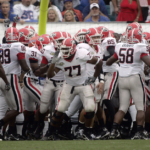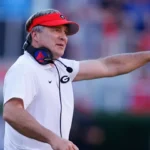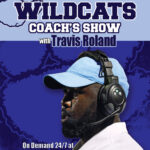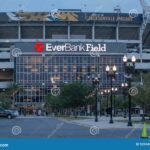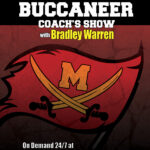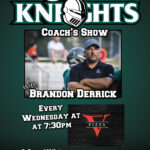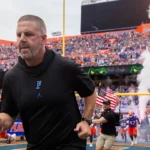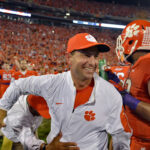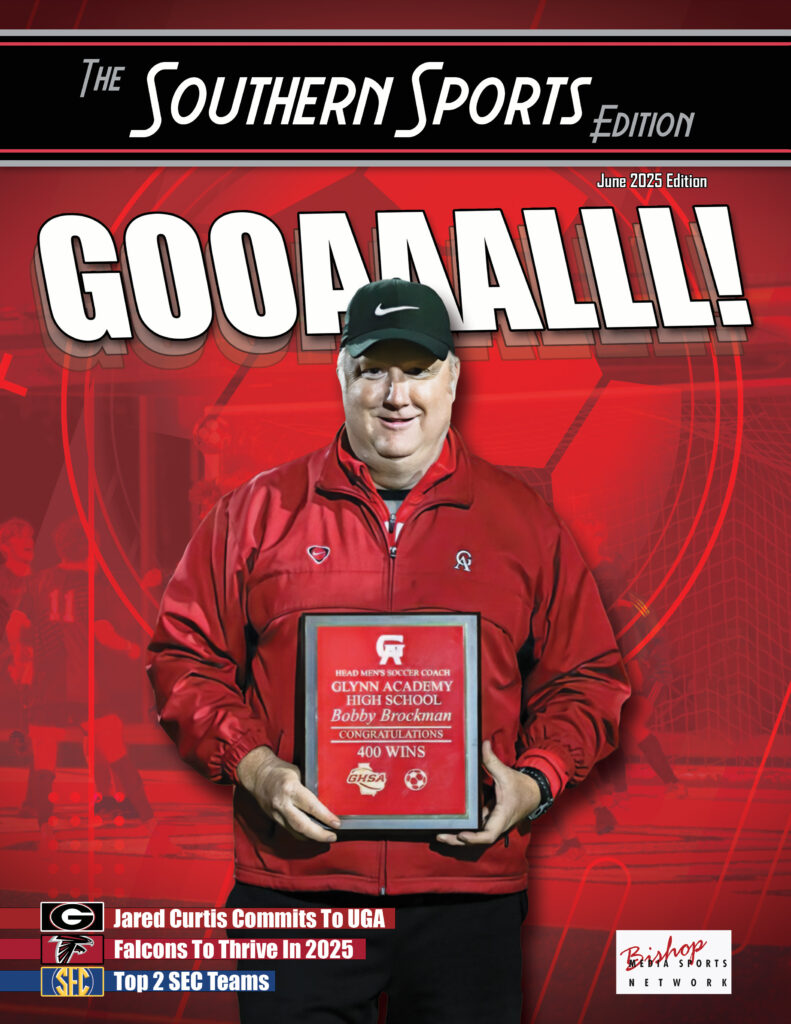Bishop Media Sports Network
Memorable Cocktail Games
 By: Kenneth Harrison
By: Kenneth Harrison
TheSouthernSportsEdition.com news services
The Georgia-Florida game is one of the best rivalries in college football. Let’s look back over the years at some of the best performances from this rivalry game.
1997 #14 Georgia 37 #6 Florida 17: The defending national champion Gators were on a seven-game win streak against UGA.
The Bulldogs were 20-point underdogs because of this. The Gators had won 52-14, 52-17 and 47-7 the previous three years against the Bulldogs.
Robert Edwards rushed for 124 yards and four touchdowns. He seems to be a forgotten about player but he led Georgia to a major win.
1995 #3 Florida 52 Georgia 17: This was Florida’s only trip to Athens since the game was permanently moved to Jacksonville in 1933. This was the first season for the expansion Jacksonville Jaguars and the city had to make renovations to the Gator Bowl. The series was moved to a home-and-home series in 1994 and 1995.
Quarterback Danny Wuerffel threw for 242 yards and 5 touchdowns in just under three quarters. Backup QB Eric Kresser tossed two more touchdowns in the 4th quarter, with the last one with 1:10 left in the game.
“You could always tell there was a little extra pep in [Spurrier’s] step when it was Georgia week,” wide receiver Chris Doering said. “It was cool being one of the few teams that ever got the chance to play Georgia in Jacksonville, Gainesville and then going up there in ‘95.”
1980 #2 Georgia 26 #20 Florida 21: Freshman tailback Herschel Walker rushed for 238 yards and a touchdown on 37 carries. He’s actually an afterthought when people look back at this game though because of how it ended.
UGA trailed 21-20 when they took over the ball at their 8-yard line with 1:35 left in the game. They lost one yard on first down and threw an incomplete pass on second down.
On third-and-eleven QB Buck Belue completed a pass to flanker Lindsay Scott near the UGA 25-yard line. Scott seemed to be surrounded by Gators but he cut towards the Georgia bench and ran down the sideline for a 93-yard touchdown.
2002 Florida 20 #5 Georgia 13: It’s tough to view a Gator win as an upset during this time period because they had won 11 of the last 12 meetings before this.
UF had first year head coach Ron Zook and they were struggling, coming into this game 5-3. Georgia, on the other hand was 8-0 under Mark Richt in his second season.
The Florida defense did not allow a single third down conversion on the day, the Bulldogs were 0-for-13.
Florida QB Rex Grossman completed 36 of his 46 pass attempts for 339 yards, two scores and two interceptions.
2007 #20 Georgia 42 #9 Florida 30: Florida won the national championship the year before. Head coach Urban Meyer was doing a great job bringing talent to Gainesville, which included quarterback Tim Tebow. He would become the first sophomore to win the Heisman Trophy in 2007 but he was not the star of this game.
Bulldog running back Knowshon Moreno rushed for 188 yards and 3 TD’s. QB Matt Stafford passed for 217 yards, 3 scores and 1 interception.
The coolest thing about this game was after Moreno scored a 1-yard touchdown in the first quarter. The entire Georgia team ran into the end zone to celebrate.
It would later be known as the ‘Gator Stomp’ and it is one of the best images in college football history.
In Or Out?
 By: Charlie Moon
By: Charlie Moon
TheSouthernSportsEdition.com news services
Misinformation, lies, rumors, conspiracy; goodness knows we’ve heard those words all too often the last decade or so, especially the last few weeks.
People try to figure out if what they’re seeing or reading is really true or not. In the end, let’s be honest, most people end up gravitating to the words, opinions and stories that only tell them what they want to hear anyway. They stake their public stances that come from the person, leader or coach that they already claim.
It doesn’t matter if their coveted leader says, “Cats are now the ones really in control of interest rates” or ”I heard that people in California are now going to have to all raise their own cows, because all dairy and beef products have suddenly become nuclear-reactive to the interior steel of grocery store trucks.”
Ahhhhh, and you thought I was talking about politics? The truth of the matter is, the same can be said for sports journalists and prognosticators. Anyone who props up their team is a genius and those that dare negate them are just morons.
Well, some of you will think I’m an idiot after reading this today. Here’s my stake on what the inaugural 12-team College Football Playoff will look like.
Coming into this season I thought, like many, this would be the most intriguing college football season ever.
We got expanded conferences. Now, we have The Red River Rivalry showcasing the SEC? We got old school Rose Bowl matchups all season like the Penn St – USC game.
Look, I get it. NIL and the transfer portal have forever changed the game. And like I thought, it looks like the portal is doing more damage than anything.
Here’s a reminder of what the field of 12 will consist of.
The obvious is this, a combination of five conference champs and seven at-larges get in.
Here’s where the misnomer comes in. Most folks think the highest ranked non-Power 4 conference champ is in. That’s not quite true, although it may work out that way.
Actually, the champs of the 5 highest ranked conferences are in. The next 7 highest-ranked teams get at-large bids.
Let’s go.
The easiest thing is, the Power 4 conferences will assuredly be the SEC, Big Ten, ACC and Big 12, in no particular order.
Let’s start there, the current top 5 conferences.
SEC Champ will be UGA. Okay, okay. Some like to call me a homer, but sorry. When I’m at the tailgate, I speak my heart for sure. But when I’m on the job, it’s about business.
Texas will lose to UGA next week and on the road at either Texas A&M or Arkansas.
UGA runs the rest of their slate, while Bama loses at LSU.
That leaves the sneaky Bayou Bengals running my slate clean. UGA beats LSU in the conference championship.
Big Ten Champ will be Ohio St. Yes, they lost to Oregon but will take down the Ducks in a Big Ten conference title rematch game.
The ACC will be Miami once they beat Clemson in the ACC title game. In this season’s College Football Preview, I predicted the Canes to be a dark-horse playoff team, so I’m sticking with them.
The Big 12 will perch the Iowa State Cyclones under the sneakiest, best Head Coach in college football, Matt Campbell.
Next up is a tough one. I think Boise St is definitely the best team outside these top 4 conferences but remember the guideline – “top 5 conferences.”
There is no “top ranked team outside the Power 4” like most think. That said, part of the conference rankings are quantified by the human playoff committee.
I think Conference USA easily tops the Mountain West with Army, Navy and Tulane besting the Mountain West’s top 3 of Boise, San Jose and UNLV.
In the end, I think the committee will hoist Boise, as they rank the Mountain West over the AAC.
Last, we got the next highest-ranked teams. Simple, here’s who I see as the at-larges: Texas, Alabama, Oregon, Indiana, Tennessee, Penn St, LSU.
Happy hunting everyone.
Camden County Wildcats Coach’s Show w Travis Roland October 15 2024

Where’s The Game?
 By: Colin Lacy
By: Colin Lacy
TheSouthernSportsEdition.com news services
The “World’s Largest Cocktail Party” has become a staple in college football and the sports world for the game, the atmosphere, and the pageantry around one of (if not the single) best rivalries in College Football. Each year half of EverBank Stadium, Home to the NFL’s Jacksonville Jaguars is filled with red and black while half is filled with blue and orange.
Since 1933, all but two Georgia/Florida (or Florida/Georgia depending on which side you sit) matchups have taken place in Jacksonville. But the question raises…Why Jacksonville?
The only matchups since 1933 that haven’t taken place in Jacksonville were in 1994 & 1995 because the Gator Bowl had been demolished, and the (then) Jacksonville Municipal Stadium construction was still in progress as the ‘94 meeting moved to Gainesville & ’95 called Athens home.
1933 wasn’t the first time the two met in Jacksonville, as a matter of fact just the second all-time meeting came in Duval County in 1915.
Leading into the 1933 season, administrators from both schools had talked about moving the game to a neutral site, but where?
Florida Historian Norm Carlson said in an interview with Florida Football that transportation was the reason…
“They moved that game to Jacksonville in 1933 because fans of both schools could easily get there by train,” said Carlson in a 2016 interview. “It turned out right. The game was sold out the first year and from then on that was held in Jacksonville.”
That’s one reason, but if you ask ten historians, you may get ten different answers. So why else has this 80-year tradition stood?
You have to remember back in the early 1900s college football stadiums weren’t the cathedrals they are today, so it wasn’t out of the ordinary for rivalry games across the country to be held at a neutral site to allow for a larger crowd.
Georgia historian Loran Smith said in a 2023 interview with 11Alive in Atlanta, “ “Georgia had a rickety old baseball field which served as the football field. We played Georgia Tech in Atlanta every year for a number of years.”
There have been many conversations about moving this game over the years, but administrators from both sides still see the value of playing in the bigger city.
Jacksonville wasn’t the only neutral site for this game. The first ever meeting between the two took place in Macon while also seeing stops in Tampa (1919) and Savannah (1928 & 1930). Athens has hosted the game five times while Gainesville has only seen this matchup inside the city limits twice (1931 & 1994).
In recent years there has been some questions surrounding the Jaguars rebuilding EverBank Stadium and what would happen to this game, but all parties have an agreed to extend the option in the current contract and keep the game in Jacksonville until at least 2025.
While Georgia is still trying to prove it’s at the elite level in the game, and Florida is trying to get their program right, you can throw it all out the window. The World’s Largest Cocktail Party will be rocking in Duval County!
Jason Bishop Show October 10 2024

Camden County Wildcats Coach’s Show October 8 2024

MCA Buccaneers Coach’s Show October 8 2024

Frederica Academy Knights Coach’s Show w Brandon Derrick October 2 2024

Napier To Get Chomped?
 By: Michael Spiers
By: Michael Spiers
TheSouthernSportsEdition.com news services
The Florida Gators football program is facing serious pressure as they get ready to host UCF at The Swamp.
Despite the team’s recent struggles, Gator fans have stayed loyal, packing the stadium for every game. But their patience might be wearing thin.
Under head coach Billy Napier, the results at home have been mixed—10-6 over two and a half seasons—and this year, Florida’s just 1-2 in Gainesville.
Even more worrying, they’ve lost four of their last five home games, including a painful overtime defeat to Arkansas.
Florida’s current 2-2 record (1-1 SEC) has raised plenty of eyebrows, and Saturday’s game against UCF feels like a must-win, not just for the season, but for Napier’s future as head coach.
Losing to UCF, a team with a much less storied football history, could be a huge blow. Gator boosters and fans aren’t going to accept a loss to a program that started playing in Division III back in 1979. For Napier, a loss could be the final nail in the coffin.
One of Florida’s big problems this season has been their slow starts. Sure, they built a 21-point first-half lead in their win over Mississippi State, but in other games, it’s been a different story.
They were shut out in the first half against Texas A&M and managed just 10 points in the first half of their opening loss to Miami.
Napier knows this has to change, especially at home, where the energy of the crowd can make a big difference. “Starting fast is critical to playing winning football,” he said, hoping the home crowd will help give his team the boost they need.
But the issues go beyond just the slow starts. Florida’s defense has been shaky, to say the least. They’re near the bottom of the SEC in both scoring defense and total defense, allowing way too many points and yards.
After their win against Mississippi State, the Gators had an open week to work on some of their defensive issues, especially when it comes to dealing with fast-paced offenses.
Cornerback Jason Marshall Jr. admitted the team struggled with tempo in the Mississippi State game, saying they sometimes found themselves just standing around, waiting for signals. That’s something they’ve been working on ahead of UCF.
UCF, by the way, will have a familiar face at quarterback: KJ Jefferson. Gator fans will remember him from last year, when he led Arkansas to a shocking upset over Florida at The Swamp.
Jefferson is a dual-threat quarterback, and his size and athleticism will make him tough to handle again. Napier knows it’s going to be a challenge, saying Jefferson creates problems because of his physicality. Marshall also noted that Florida’s defense needs to take away Jefferson’s ability to run and force him to beat them through the air.
On top of all the on-field problems, Florida’s dealing with some off-field headaches too. Recruiting has taken a hit recently, with prospects like four-star safety Demetres Samuel Jr. flipping his commitment from the Gators to Syracuse. Florida’s current recruiting class is ranked 21st in the nation, which isn’t terrible, but it’s far below what Gator fans are used to.
Recruiting experts are already warning that the uncertainty surrounding Napier’s future could make things even worse.
When a coach is on the hot seat, it affects recruiting, creating a vicious cycle of bad results and missed opportunities to bring in top talent. And there’s even more at stake if Napier is fired midseason, thanks to the transfer portal.
Even former Alabama coach Nick Saban chimed in recently, criticizing Florida for cycling through coaches without finding real success since Urban Meyer left.
Saban thinks the issues run deeper than just coaching and pointed to the overall structure of the program as a problem. He suggested that if Florida doesn’t figure things out, they’re going to continue struggling as the season goes on.
So, heading into this weekend, the Gators are at a turning point. Beating UCF could give them a much-needed boost and calm some of the noise surrounding the program.
But another loss, especially at home, might push things even closer to the breaking point for Napier and his staff.
Back To The Front
 By: Kenneth Harrison
By: Kenneth Harrison
TheSouthernSportsEdition.com news services
Clemson started the 2024 football season by getting pummeled 34-3 to #1 Georgia. This caused us to look at the Tigers and wonder if the game had passed by head coach Dabo Swinney. After he suffered his worst lost in more than a decade, Swinney was optimistic.
He watched film from the UGA game and saw a team that, according to him, matched Georgia physically and lost, in large part, due to a handful of unforced errors and an inability to capture any “momentum.”
“We matched up well. It didn’t go our way, but we were physical, we could run. We’ve got a good team,” Swinney said. “We’ve got a bunch of good, young talent. It’s going to come together, and it’s going to be fun to watch.”
Is he optimistic, delusional or correct in his assessment? One thing he has not adapted to is the transfer portal era we are living in now. Four FBS programs do not accept transfers. They are Army, Navy, Air Force and Clemson. As you can see, one of those things is not like the others. It makes sense for service academies to do but it is strange that a regular Power 4 school does not.
“We’ve done it in a unique way,” Swinney said. “Now people want me to go do it some other way. They’ve lost their freakin’ mind. I’m not doing it another way. Everything doesn’t go the way you want it every single time, but that doesn’t mean you get away from what your foundation is, what you believe.”
As Swinney would say, the Clemson stock took a hit after the first game. The Tigers have responded with three straight wins since then and they are now ranked #15.
All three of their wins have come at home against Appalachian State, NC State and Stanford. The closest margin of victory was 24 points against NC State. The Wolfpack came into the 2024 season as a top 25 team but they were trounced 51-10 in Week 2 by Tennessee. Clemson has not faced world-beaters over the last few weeks.
Clemson’s player retention rate is among the best in the country — only Northwestern and Oklahoma State had fewer players leave in the December window than Clemson’s 12. They also had the highest graduation rate of any Power 4 school. Clemson is the only team in the country to rank in the top 25 in both the AP rankings and graduation rates for 13 years straight.
Clemson’s record from 2021 to ’23, the supposed downturn of the program — was 30-10, the eighth-best mark of any program in that span. Maybe they were having issues because Trevor Lawrence and Travis Etienne left for the NFL.
They have their first true road game of the season at Florida State (1-4) this week. It’s ironic because the Seminoles QB, DJ Uiagalelei started at Clemson. Then he transferred to Oregon State and now FSU. He took some parting shots at the Tigers after he transferred.
“I didn’t want to do what I was doing at Clemson,” said Uiagalelei. “I didn’t really like what we did there scheme-wise. I didn’t think we did very much. I thought it was very basic. It didn’t help me out as a quarterback and play to my strengths.”
He was benched after a bad loss to ACC newcomer SMU last week, so he’ll watch this game from the sideline.
The Tigers only have one ranked team on the schedule the rest of the season. I think they will be 11-1 going into the ACC Championship game.
